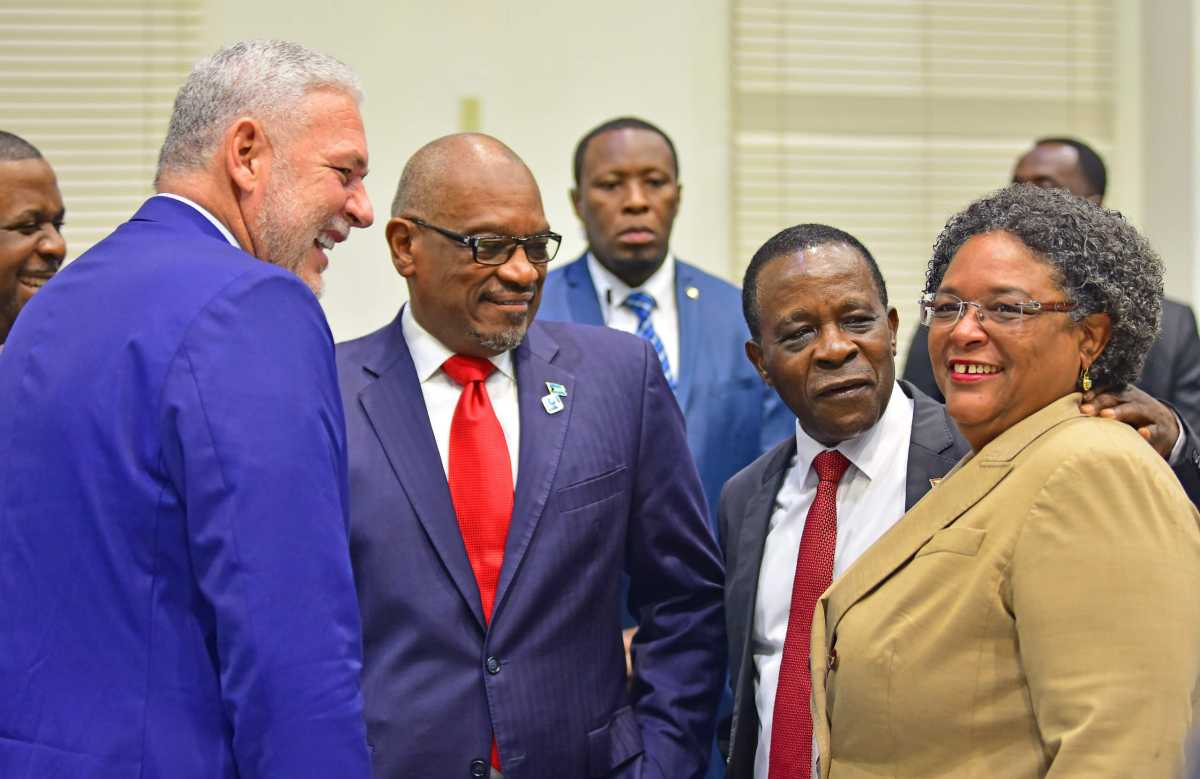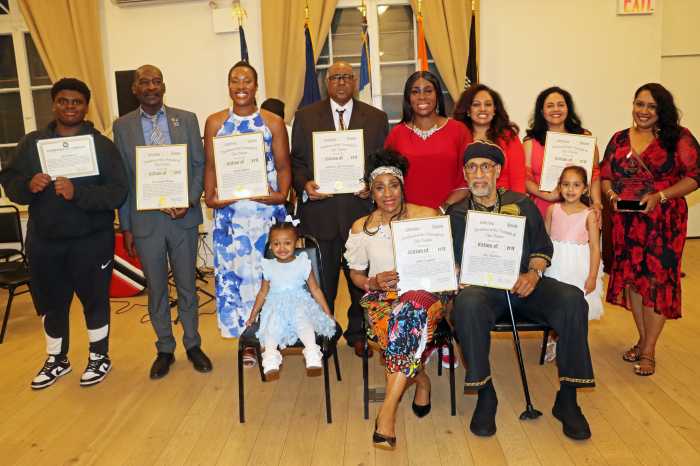Barbados
The Barbados government plans to recognize same-sex relationship, according to Governor General Dame Sandra Mason.
However, she said her government is not going to allow any form of same-sex marriage, which will be put to a referendum and guided by the vote of the people.
The governor general was at the time addressing the opening of a new term of the Barbados Parliament on Tuesday, Sept. 22.
Dame Mason in outlining the priority areas for the Mia Mottley administration over the next 12 months said the island has always been in the vanguard of pioneering social justice, the protection of civil rights and the battle to ensure dignity to the poor, marginalized, vulnerable and dispossessed.
She said the legal system of modern societies recognize many different forms of human relationships and that Barbados is now increasingly finding itself on international lists, including within the multilateral system, which identify the island as having a poor human rights record.
“If we wish to be considered amongst the progressive nations of the world, Barbados cannot afford to lose it international leadership place and reputation. Nor can a society as tolerant as ours allow itself to be ‘blacklisted’ for human and civil rights abuses or discrimination on the matter of how we treat to human sexuality and relations,” she said.
The governor general said the Mottley administration will do the right thing, understanding that this too will attract controversy.
Caribbean
Caribbean Community (CARICOM) leaders have taken a major step towards reviving the (COVID-19) — challenged travel and tourism sectors, with agreement to institute a travel bubble among member and associated states, according to a statement issued by the Guyana-based CARICOM Secretariat last week.
It said that the regional leaders took the decision during a special emergency session recently, “at which they acknowledged that the past six months have been a very challenging period globally and regionally, as countries have struggled to cope with the effects of the novel coronavirus.”
The leaders agreed that the bubble could come into effect from this week (October), once the countries involved meet the agreed criteria.
According to the secretariat statement, the regional leaders have noted that for CARICOM, it has been particularly difficult in most of the economies on the travel and tourism sectors.
The statement said the recommendations included that countries would be categorized ranging from those with no covid cases to those which had low, medium, high and very high risk with respect to the rate of positive cases over a 14-day period
Guyana
The Barbados-based Regional Security System (RSS) will be assisting Guyana to help in the probe of the recent murders and unrest in sections of the country.
Vice President Bharat Jagdeo made this announcement during a live forum.
He said the team will be dispatched to Guyana shortly to ensure that a transparent investigation into the killings of two cousins — Joel Henry, 26 and Isiah Henry, 19, along with the murders of two others — Haresh Singh, 17 and Chatterpaul Harripaul, 34.
The RSS — is an international agreement for the defense and security of the eastern Caribbean region. It was created in 1982 counter threats to the stability of the region in the late 1970 and early 1980s.
Jagdeo said the RSS has already been contacted and will be sending a team of people, the regional security group to assist the police with their investigation because “we want everybody to know there is going to be no cover-up.”
While the RSS will be working in conjunction with the Guyana Police Force, Jagdeo said the government has taken a proactive step of contacting the United Nations to identity those who are responsible for fueling hate and ethic division among the people.
Grenada
Grenada has announced that it will adopt new protocols for the hospitality and entertainment industry as part of the measures to boost economic activities, given that the island has not recorded any positive case of the COVID-19 virus for the past two months.
Minister of Health, Nicholas Steele said the time has come that livelihoods be protected as best as possible, noting that the government has recognized like other governments around the world that focus too much on lives can result in livelihood being lost.
He said over the past few weeks the authorities have evaluated other best practices from the region and other jurisdictions in dealing with the virus that has affected 24 people in Grenada since the first case was detected in March.
The new protocols, which will be regulations under the Public Health Act, will allow for new measures in place so as to grant permission for mass gatherings based on the size of the venue.
Steele said the tourism sector has been significantly affected because of the measures, including travel, undertaken by countries to prevent the spread of the virus.
Permission for social activities will ran k from simple sit-down dining to dancing/feting events.
Jamaica
The Jamaica government has announced an extenuation of the existing curfew as it seeks to curb the spread of the COVID-19 virus that has so far infected more than 5,000 people.
Prime Minister Andrew Holness, speaking at a virtual news conference, said the curfew, which runs from 8 pm to 5 am daily will remain in place until Oct. 7 and urged persons not to seek to violate the measure.
Holness told reporters that the business community and the traveling public have expressed some concerns regarding the start of the curfew, but noted that where the new measures will not affect production and output, private sector and public sector businesses should allow employees to work from home.
He said the government has put in place measures designed to prevent movement “because ultimately the virus does not have legs of its own.”
The prime minister said he was also being very careful in indicating the government understands how the pandemic works, given that it had to take into consideration the possibility of deaths and other situations that could occur.
Suriname
Suriname has devalued its dollar by nearly 90 percent against the US dollar. One US dollar now fetches $7.46 of the South American country’s currency.
Following the announcement last week, the price of fuel, which has been subsidized by successive governments over the years, saw a dramatic increase.
The subsidy was recently abolished by the newly-appointed government. Previously fuel was imported on the basis of the official exchange rate with the US dollar.
Immediately after the devaluation was announced, the two telecommunications companies increased their rates- something that has not happened since 2016. As a result, the rates of Digicel and Telesur will increase by almost 90 percent.
The companies state they have been forced to adjust the rates of their services.
The Association of Suriname Businesses has asked the government to lower the price of diesel.
It warned that the effect of the increased diesel prices will lead to an enormous increase in costs for the Surinamese population, as most of the transportation sector relies on diesel fuel.
Trinidad
Trinidad and Tobago-owned Caribbean Airlines Limited (CAL) is moving to reduce its salary bill by sending some employees on no-pay leave, reducing the salaries of others and temporarily laying off some workers.
Airline officials say the move is to keep the airline operational and is in line with cost-cutting that has been implemented in many airlines around the world in international travel caused by the COVID-19 pandemic.
Since COVID-19 hit the Caribbean in March 2020, the airline’s flights and its revenue have declined drastically as borders were closed to contain the spread of the deadly virus.
CAL has proposed to place its contract pilots, who are over 60, on no-pay leave for a three months from October to December 2020.
The airline also proposed to reduce the salaries of all other staff by between 15 and 20 percent, based on their salary levels for six to eight months, starting this week, when the airline’s October pay cycle begins.
Since T&T’s borders were closed on March 23, CAL has paid all employees their full salaries, while the airline operated on a restricted basis, offering special flights to bring stranded nationals and take students back to their homeland.
— Compiled by Azad Ali




















